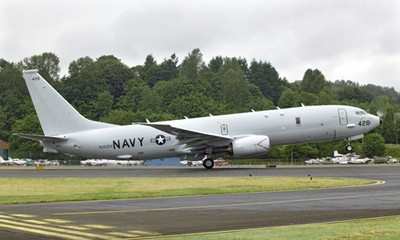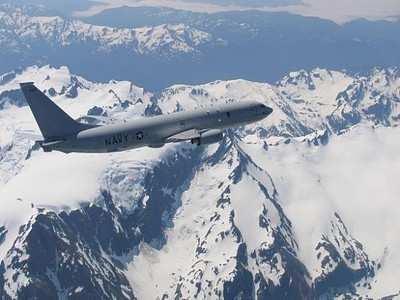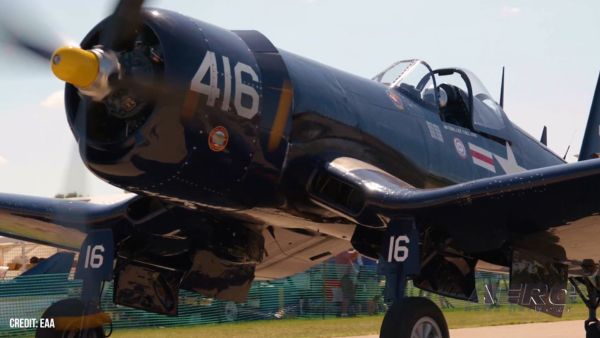Wed, Jul 20, 2011
Navy Plans To Eventually Acquire 117 Of The Aircraft
The first P-8A Poseidon production aircraft completed its first
flight on July 7, taking off from Renton Field and landing three
hours later at Boeing Field in Seattle. The P-8A is the first of
six low-rate initial production (LRIP) aircraft Boeing is building
for the U.S. Navy as part of a $1.6 billion contract awarded in
January.

Boeing Photo
The successful flight marked LRIP-1's
completion of final assembly in the company's Renton factory and
transition to mission system installation and checkout in Seattle.
Boeing will deliver LRIP-1 to the Navy next year in preparation for
initial operational capability, which is planned for 2013.
"This is the first P-8 that will go directly to the fleet in
Jacksonville, FL, so the aircraft's first flight is an important
milestone for the Boeing team and our Navy customer," said Chuck
Dabundo, Boeing vice president and P-8 program manager. "We're on
plan to get LRIP-1 to the Navy in 2012."
"As the Navy's replacement for the P-3 Orion, the P-8A Poseidon
represents the next generation of maritime patrol and
reconnaissance aircraft," said Capt. Michael Moran, program manager
for Naval Air Systems Command's Maritime Patrol and Reconnaissance
Aircraft program office. "The fleet is actively preparing to
receive the LRIP-1 aircraft and begin the transition."

The Navy plans to purchase 117 of the
Boeing Next-Generation 737-based P-8A anti-submarine warfare,
anti-surface warfare, intelligence, surveillance and reconnaissance
aircraft to replace its P-3 fleet. In order to efficiently design
and build the P-8A aircraft, the Boeing-led team is using a
first-in-industry, in-line production process that draws on the
company's Next-Generation 737 production system. All aircraft
modifications unique to the P-8A are made in sequence during
fabrication and assembly.
This is the first P-8A to include a new CFM56-7BE engine
configuration that is now standard on all delivered Next-Generation
737s. The configuration is an improved design that includes high-
and low-pressure turbine modifications. Coupled with drag reduction
improvements that Boeing started phasing into 737 production
earlier this year, it will result in lower fuel consumption and
maintenance cost savings.
Separate from the production contract, Boeing was awarded a System
Development and Demonstration contract in 2004 to build and test
six flight-test and two ground-test P-8A aircraft. The first four
flight-test planes are completing testing at Naval Air Station
Patuxent River, Md. The program's static test plane, S1, completed
its test program earlier this year.
More News
“While legendary World War II aircraft such as the Corsair and P-51 Mustang still were widely flown at the start of the Korean War in 1950, a new age of jets rapidly came to >[...]
Decision Altitude (DA) A specified altitude (mean sea level (MSL)) on an instrument approach procedure (ILS, GLS, vertically guided RNAV) at which the pilot must decide whether to >[...]
Aero Linx: National Aviation Safety Foundation (NASF) The National Aviation Safety Foundation is a support group whose objective is to enhance aviation safety through educational p>[...]
Also: Cal Poly Aviation Club, $$un Country, Arkansas Aviation Academy, Teamsters Local 2118 In response to two recent general aviation accidents that made national headlines, more >[...]
“The FAA is tasked with ensuring our skies are safe, and they do a great job at it, but there is something about the system that is holding up the medical process. Obviously,>[...]
 Aero-News: Quote of the Day (04.28.25)
Aero-News: Quote of the Day (04.28.25) ANN's Daily Aero-Term (04.28.25): Decision Altitude (DA)
ANN's Daily Aero-Term (04.28.25): Decision Altitude (DA) ANN's Daily Aero-Linx (04.28.25)
ANN's Daily Aero-Linx (04.28.25) Airborne-Flight Training 04.24.25: GA Refocused, Seminole/Epic, WestJet v TFWP
Airborne-Flight Training 04.24.25: GA Refocused, Seminole/Epic, WestJet v TFWP Aero-News: Quote of the Day (04.29.25)
Aero-News: Quote of the Day (04.29.25)




